Peter MALONE
Saturday, 18 September 2021 19:27
Bootleg
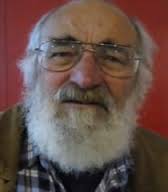
BOOTLEG
Australia, 1985, 105 minutes, Colour.
John Flaus, Ray Meagher, Carmen Duncan, John Gregg.
Directed by John Prescott.
Bootleg is a small-budget ambitious feature which did not win an audience.
The film was written and directed by John Prescott, who made an excellent film debut with his AFI Award-winning short fiction film A Town Like This (a variation of the Wake In Fright theme). Here his story is much more extended - but not well-written (often over-written), complex with too many strands of little dramatic moment.
The film traces the adventures of a Sydney private-eye, Joe Hart. He is presented as a middle-aged, isolated namby-pamby man with a possessive mother whom he puts in a home while he is away on business. There is some satire here - with the ending in a Catholic church with mother and son singing the Chariots of Fire - Jerusalem hymn (not quite appropriately).
In the meantime, he goes to Brisbane, plays the saxophone and is mistaken for a hit-man by the Queensland police and as a talented musician who is helping people in the bootleg record industry. He does some detecting along the way, restores a lost daughter to her father and has an affair with an ageing call-girl who is bashed because of her connection with him. Along the way he sees some of the seedier aspects of Brisbane - including a long tunnel peopled with homosexual prostitutes.
This indicates the tone of the film's view of Queensland and its satiric criticism of it. It uses caption devices and ironic exaggeration of the, way that southern states see the Queenslanders. This is especially evident with the portrayal of the police, especially Ray Meagher as a cocky hatted tough Right-Wing? style Head of Police with his eager young secretary and eager young police ready to shoot or bash anyone. They are mistaken in their pursuit of Hart. The film also has much reference to orders coming from the top.
There is also a focus on the anti-nuclear protest - some protest sequences which then become lost as the film focuses on one of their leaders, T.C. Brown (played by John Gregg) who is obsessed about the coming destruction and wants to build a shelter in the north. fie is also in search of his pregnant daughter Netha (Shelley Friend, who has some of the worst dialogue along with Ian Nimmo as Lucan, her boyfriend). Lucan is involved in the bootleg record industry. There are also record industry thugs (an idiotic man and two idiotic women) stalking Hart.
There is also an alcoholic veteran news reporter who has long speeches explaining the political situation in Queensland and who gives information for Hart to highlight the government's involvement in some terrorist bomb explosions.
Most of this material is interwoven but not particularly skilfully. Characters move out of the film for long stretches.
The film is not well-written in its dialogue - although John Flaus as Joe Hart gives his best and tries to make a character. Carmen Duncan does her best with the call-girl role and Ray Meagher and John Gregg exaggerate with some sinister tone in their roles. Max Meldrum is effective in his performance as the reporter.
What might have been an entertaining private-eye with political overtones turns out to be a film that does not entice an audience to interest in or sympathy with the characters.
Published in Movie Reviews
Published in
Movie Reviews
Tagged under
Saturday, 18 September 2021 19:27
Bert Rigby, You're a Fool

BERT RIGBY, YOU'RE A FOOL
US, 1989, 94 minutes, Colour.
Robert Lindsey, Robbie Coltrane, Cathryn Bradshaw, Bruno Kirby, Corbin Bernsen, Anne Bancroft.
Directed by Carl Reiner.
Bert Rigby, You're a Fool is directed by Carl Reiner. Reiner had success as a director of many comedies (as well as writer), especially with Mel Brooks and then Steve Martin (The Jerk, Dead Men Don't Wear Plaid, All of Me,). This is a star vehicle for Robert Lindsay, the English song and dance artist who made such a success on Broadway in Me and my Girl.
The film is by way of anecdote, a Hollywood anecdote which takes us back to England and then to the uglier sides of Hollywood. It has a lot of comic routines, some song and dance in the Kelly, Astaire - Rogers manner. The supporting cast is quite strong with Robbie Coltrane as an agent, Anne Bancroft doing a variation on her Mrs Robinson style, Bruno Kirby as a Hollywood producer, Liz Smith as Bert's mother. In many ways, the comedy is something of a hit and miss entertainment.
There are some very good moments, some slack moments, some corny moments.
1. A musical anecdotal entertainment? Storytelling? Musical comedy?
2. The English locations, the American locations? The blend and the contrast between the two? A look at Hollywood?
3. The musical score, the choreography? The tradition of Gene Kelly, the dedication to him? Astaire and Rogers? Songs and dances? The range of classic 30s songs? A star vehicle for Robert Lindsay?
4. The work of Carl Reiner, his comedies? Observations on things American? Eccentric American characters? The strong cast?
5. The opening with Bert telling, his story, the anecdotal overture of the movie - and therefore its tone, whether it was all true or not? The ending with a new anecdote and the happy finale?
6. Robert Lindsay as Bert, as a miner, on strike, at home, his relationship with his mother, love for Laurel, meeting her? His hopes in the town, for refurbishing the cinema for his career as a song and dance man?
7. His going with Sid Trample? Robbie Coltrane and his presence, bully? The amateur show? The routines, the singing, Lindsay and the faking the fluffing of the song? The competitions, the people, Comperes? A future in the amateur show? Sid and his dominating style?
8. Bruno Kirby as the Hollywood producer, his American style? his patter? Persuading Bert and Sid to go to Hollywood? The working with the commercials? The preparation for the commercials, the deals? Sid and his agent? Sid's disappearance and leaving Bert stranded with the bills?
9. Mrs Perlestein, Anne Bancroft's screen style? Wealth, home? Hollywood productions? Her lifestyle, her sexual advances? Her dominance, his backing away from her? Her ruining him? The Van Gogh going up in flames?
10. Jim Shirley - the star, his work with the producer, his style, needing the coaching? Bert working with him?
11. The art gallery sequence, the hold-up, Bert being there, foiling the attempt despite himself?
12. In the bar, doing his song and dance routine? The new agent signing him up? Success? The finale in the cinema, Laurel and the baby? The fulfilment of his dreams?
13. A succession of entertaining anecdotes, serious and comic touches? Songs and dances?
Published in Movie Reviews
Published in
Movie Reviews
Tagged under
Saturday, 18 September 2021 19:27
Beethoven
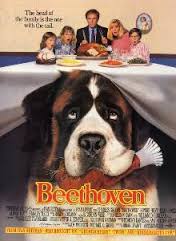
BEETHOVEN
US, 1992, 87 minutes, Colour.
Charles Grodin, Bonnie Hunt, Dean Jones, Oliver Platt, David Duchovny, Stanley Tucci.
Directed by Brian Levant.
Beethoven is not the musician but a very large dog. The film was a great success with family audiences all over the world. It has the usual dog jokes and does them with some finesse and a great sense of humour. Charles Grodin is a good sport in being the cantankerous father of the family who is not at all persuaded of Beethoven's charms like his wife and children. Dean Jones(who loves dogs in such Disney films as The Shaggy D.A.) is a villainous vet. There are comic villains (like those in Home Alone) and some American children with cute touches but not too sugary. The very attractive score by Randy Edelman contributes to the atmosphere.
1. The popularity of dog films? Dogs, playfulness? Pets?
2. American suburbia, the street, house, school, vet's office? Audiences identifying with the situations?
3. Dog stories? The stunt work? The contribution of the musical score?
4. Audiences and pets, loving pets, pets as threats? The disruption and mess of pets for those who do not like them?
5. The opening with the dog catchers, their taking the dogs? The violence towards the animals? The doctor, sinister, his thick lenses, his voice? The plans? The stealing of the dogs -the alarm in the shop? The truth, the behaviour of the two dog catchers? The dogs escaping? Their later plan with the testing of ammunition with the does? The final getting rid of the evidence? The dog chases, hopping the fence only to find the guard dogs? In court?
6. The introduction to Beethoven and the other dogs? Taken, the escape? The pet shops? Beethoven and his hiding in the garbage tin? Meeting George, going into the house, the dogs eye tour of the house and the introduction to the children? The question about his name and the piano playing? The varying reactions to Beethoven? The scenes of his growing up very quickly? The amount of mess made in the house? Wasting a lot? in his kennel, getting out the back? Going to school and helping Rice and the fetching of the stick? Frightening the bullies With Ted? His sense of Emily in danger, rescuing her from the pool? The financial backers and his dislike of them?
7. Their affectation, tying them to the chairs of the table, racing away with them? The vet and his attack, Beethoven as victim? His being taken by George, put into the cages? The final escape, the confrontation - and the reconciliation all round? Beethoven as the family pet despite the costs the food? And all the dogs in the bedroom at the end?
7. The American family: Emily, her love for the dog, her lying in the pool, being rescued by Beethoven? her seeing what the vet did? Rice and her attraction towards Varic, his ignoring her, looking at him - and Beethoven's help? The final phone call? Ted, his glasses, bullied in the dining room? On the bus? Beethoven's scaring the bullies off? his toning up his muscles in the mirror? George, his dislike of Beethoven, being the victim of all Beethoven's mess on his room, his clothes, his food? Alice and her liking Beethoven? The children's reaction to Beethoven's attack, to the vet? To their father's heroism - his climbing the wall, crashing through the roof, confronting the vet? The children driving the car? their going on and becoming the heroic family?
9. The business partners, their affectation, their visit and Beethoven's sensing them? Not signing the document? Their comeuppance?
10. The sinister doctor, his plans with the animals, being a vet? The company and the money for the tests? His treatment of Beethoven? the visit to the house, George and the confrontation, pretending the attack had taken place?
12. The chemical injections at the end?
13. The popular ingredients for the family film, dangers and crooks, heroic dogs, comic touches and jokes? And the happy family at the end?
Published in Movie Reviews
Published in
Movie Reviews
Tagged under
Saturday, 18 September 2021 19:27
Bad Sleep Well, The
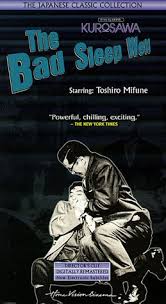
THE BAD SLEEP WELL
Japan, 1960, 135 minutes, Black and white.
Toshiro Mifune.
Directed by Akira Kurosawa.
The Bad Sleep Well is a contemporary story of 1960, directed by Akira Kurosawa. By this time, Kurosawa had established his reputation in Japan and throughout the world with his Samurai films (the Seven Samurai, Throne of Blood) as well as such interesting portraits of Japanese society and history of Rashomon. He had also indicated his interest in Shakespearean themes, Throne of Blood being a variation on Macbeth. This was to continue through the succeeding decades with a number of successful Samurai films including Yojimbo and Sanjuro, his picture of the Japanese doctor, Redbeard as well as adaptations of Ed Mc Bain with High and Low. In the 70s he made fewer films but won the Oscar with the Russian Japanese co-production Dersu Uzala. In the 80s he made the epic colour samurai films Kagemusha and Ran. In the late 80s and 90s he was still making such films such as Akira Kurosawa's Dreams and Rhapsody in August.
This is a strong film about Japanese business corruption, in succeeding decades still a relevant theme. It shows the westernisation of the Japanese and the complexities with their own traditions of honour and business dealings. The film is loosely based on Shakespeare's Hamlet: a young man wants to avenge his father's suicide, the father being driven to suicide by deals with an industrialist. He pretends to love the industrialist's daughter and marries her, only to find that he does fall in love with her. He saves an associate from suicide - and who is thus able to appear as a ghost to men who consciences were disturbed. However, there is the Shakespearean tragic ending, Japanese style. The good die, the bad sleep well.
1. The work of Akira Kurosawa? His reputation in Japan, around the world? His portraits of Japanese victory? Of Samurai codes? His adaptation of western classics?
2. The derivation of this film from Hamlet, the parallels, the applications? The irony of the title? The tragedy of its ending - the vanquishing of the good, the triumph of evil?
3. Black and white photography, contemporary Japan of 1960? The cities, offices, courts? Homes? Buildings and building sites? The surrounding countryside, volcanic mountains? The musical score?
4. The length of the film, its scope? The long opening with the ceremonial marriage sequence? The transition to the business offices? The mysterious sequences on the mountainside? The ghostly sequences? The confrontations? The use of evocative symbols - the building site as the wedding cake, the flag from the window where the suicide took place?
5. The focus on the company? Industrialists, their deals, negotiations with the government? Bribes? The industrialist and his driving people to death, cover-ups? His hold over his associates? The celebration of the marriage, his relationship, with his son, with his daughter, with his new son-in-law? The irony of the cake coming in and the reminder of the suicide? His concern, the suicides? His conveying messages to his associates suggesting that they kill themselves? His deals, the hearings? The role of the media and the headlines? The further investigations? The stories of Wahda as a ghost? His being disturbed? The taunts of his son? The devotion of his daughter? The mysteries about his son-in-law? The build-up to the final confrontation? His learning the truth? The death of his son-in-law and his survival? The bad sleep well?
6. Nichi, his marrying the boss's daughter? His relationship with the boss's son, friendship? The ceremony? His being involved in the work of the company? His appearing on the mountainside and stopping Wahda committing suicide? His hiding him, interrogating him? Persuading him to come out into the open, to confront the other associates in their fear? Their consciences? His gaining control? His relationship with his wife, using her, falling in love with her, compassion for her? The build-up to the plan, his not killing people - but threatening them? The confrontation with his father-in-law? His defeat and death?
7. The executives of the firm, their standing together, bribery, deals, the government? Driving associates to suicide? Cover-ups? The banquets? The media, the enquiries? Suicides? The Survivors, their fears? The associate who sorted out the information on Nichi and identified him? Their ultimately succeeding? The presentation of government officials and their involvement in corruption?
8. The industrialist son, a drifter, on the periphery, introducing Nichi to his sister? Celebrating at .the wedding? His work in the firm? The betrayal, his coming to believe in Nichi?
9. The daughter, Lame? Her love for her husband? The ceremonial? Her concern, finding out the truth, trying to persuade her father? Her failure? The death of her husband?
10. Wahda, persuaded to commit suicide, wondering on the mountain, the confrontation with Nichi? His not killing himself, giving information, the interrogations in the car? His appearing - and seen as a ghost by the others? The gradual build-up of information, getting the truth?
11. Japanese politics, ways of business, deals and cover-ups? Exposure, fraud, jail sentences? Suicide as a way out?
12. The presentation of the media, their eagerness to expose a story, following up indications and clues? Exposure in the media?
13. The film and its relevance through late decades? Big business, gambling with finances, bribes and corruption? The consequences for individual integrity, the effect on families?
Published in Movie Reviews
Published in
Movie Reviews
Tagged under
Saturday, 18 September 2021 19:27
Buddy System, The
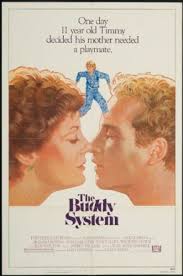
THE BUDDY SYSTEM
US, 1984, 110 minutes, Colour.
Richard Dreyfuss, Susan Sarandon, Nancy Allen, Jean Stapleton, Wil Wheaton.
Directed by Glenn Jordan.
The Buddy System is an enjoyable and leisurely comedy about relationships. It is particularly American in style and focuses on buddies - whether they be men and women, adults and children. Richard Dreyfus gives a pleasing performance as the hero and is well-matched by Susan Sarandon. Wil Wheaton is introduced as Susan Sarandon's son. He was to appear in Rob Reiner's Stand By Me in the young Steven King role. (It is interesting to note that in the adult sequences he was played by Richard Dreyfus.) There is an excellent supporting performance by Jean Stapleton (All In The Family) as Susan Sarandon's mother. Nancy Allen gives a lively eccentric performance as Dreyfuss's girlfriend. The film was directed by Glenn Jordan, usually a director of telemovies which have ranged from Les Miserables to The Women's Room and In The Matter Of Karen Ann Quinlan.
Not a must, but a pleasing look at human beings, their strengths and foibles.
1. An entertaining film? Families? Human nature? America?
2. The American city, home and environment? School and work? Musical score?
3. The title and its focus on friendships, relationships - American style? Universal?
4. Richard Dreyfuss's presence and style as Joe? Seeing him at work, security guard, at home, his inventions, his desire to write? His girlfriend and her psychology? His trapping people who send their children to the wrong school? His being blackmailed by the young boy? His befriending the boy, going to the concert? Clashing with his mother? Becoming friends with the boy, lending him books, explaining the inventions? The bonds - their becoming buddies? His being in the father role? The clash with his mother about the return of the books? Friendship, sharing, falling in love - buddies? The car breakdown and his helping his former girlfriend? Going back to her? Living in, being wearied by her psychological and dream talk? His inventions, success, failure? His exasperation? Longing for a more stable life? Going to the mother and finding out where the boy's mother was? Returning to the concert? The happy ending? Portrait of an American man? Typical? Father, love?
5. The boy and the sequences at home, his relationship with his mother, at school, with his grandmother? His swearing and his mother's comments? The bonds of love between him and his mother? The absent father? Needs? The encounter with Joe, trying to line him up with his mother? Sharing friendship, the ups and downs of the friendship, portrayed in great detail, the inventions, the home, the books and reading? His being pleased when his mother and Joe became friends? The parenting? The break? His moods? Moving home? The concert and the reconciliation? How well-portrayed were the attitudes of a young boy, his relationship with his mother and grandmother, need for a father or father-figure?
6. Susan Sarandon and her style as the heroine? Seeing her at home, lifestyle, her relationship with her son? With her own mother? The story as she told it - at high school, becoming pregnant, her mother's attitude, her father's attitude, her father's support of her, his death and her missing him? Her inability to make decisions? Commitment? Her skill as a solo parent? Going for jobs, pulling out of the typing exam? Her relationships, the affair with the boss - and the effect of his bowing out? The encounter with Joe, the concert, clash, her not being aware of her bog and the friendship with Joe, her anger in returning the books? Understanding, talk, the strength of the friendship, depth, sexual liaison, moving into friendship? The shared outings and their joy? The intrusion of Joe's girlfriend? The break-up, her being hurt? Her relationship with her mother, her mother's losing her job, not telling her mother about the new job, the decision to leave home, finding the new apartment? Her getting a better job? The happy ending?
7. The portrait of the mother: type, her house, memory of her husband, her hold over her daughter and her grandson, not affirming her daughter, her reaction to Joe, her talk about her job, losing it and not updating her qualifications? her retiring? The showdown with her daughter - the poignancy, the edge, the truth? Both parties being hurt? her giving the information to-.Joe about where to find her daughter? Her pleasure at the concert?
8. The girlfriend, attractive, work, her love for Joe, her psychological talk, referring everything to her group? The new boyfriend? Moving out? The car breakdown and her relying on Joe? Change of mind, living in, the new apartment, wearing Joe out with her psychological talk?
9. The boss, his attitudes towards his secretary, the affair? His bowing out?
10. A cross-section of contemporary life: humour, pathos, images of society?
11. Relationships: love, parenting, family?
Published in Movie Reviews
Published in
Movie Reviews
Tagged under
Saturday, 18 September 2021 19:27
Buchanan Rides Alone
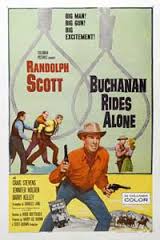
BUCHANAN RIDES ALONE
US, 1958, 78 minutes, Colour.
Randolph Scott, L.Q. Jones, Craig Stevens.
Directed by Budd Boetticher.
Buchanan Rides Alone is one of several westerns made by Randolph Scott and Budd Boetticher. Boetticher has a reputation for the tough genre action films that he made in the 50s e.g. Seminole, City Beneath the Sea, Ride Lonesome.
The ageing Randolph Scott is pleasant in the heroic role - though not too heroic (he might have been killed several times during the film). The film shows a power-hungry group of brothers in a town on the Texas border - and comments on corruption, greed, law and order. Within its brief running time there is plenty of action.
1. The popularity of the western? In the '50s? The brief western action, social issues, the American heritage?
2. Location photography, the Mexican-Texas? border, the western town? Action sequences? Musical score?
3. The focus on Buchanan, the stranger who rides into town, the mysterious past, his money, his ambitions to buy property in West Texas? The stranger in town, the reaction of the townspeople, crises and dangers?
4. Buchanan as a man of the West, ageing, experience in Mexico, gold, property in Texas? Suspicions on his arrival in the town? His nonchalant air, meeting the members of the family? The clash with Roy, Juan killing Roy and the townspeople blaming Buchanan for being in league with him? In prison, the lynching party, almost being hanged? Jail - and the change of fortune with the deal for the money? Letting Buchanan go free after the trial and his innocence? Lou and his wanting Buchanan killed - and the irony of Pecos killing the killer? Their being pursued? Buchanan's decision to return and get his money? The irony of Juan and himself ending up in prison again? The escape with the help of the Marshall? The shoot-out in the street? His going off to buy his property? An ageing heroic man of the West?
5. The brothers and their hold over the town - Amos as the busybody, overhearing things, cruel, having information, easily terrified? Simon and his bid for Senator? The Marshall and his aid? The clash with his brother about the lynching party? His deals, the Mexican coming with the money? The shoot-out - and the irony of Lou shooting him, his being able to shoot Lou before he died? Lou as the callous sheriff, his henchmen, ordering killings, greed, double-dealings, death?
6. Juan de la Vega, the clash with Roy, Roy's presumption as an Angry? Juan in jail, about to be killed, the deal, his Mexican associate? His going with Pecos, Lou's henchmen catching up, the death of Pecos? Back in jail? The final shoot-out - and the happy ending?
7. Pecos and the friendly Texan, his being asked to shoot Buchanan, his shooting the killer, his devout and prayerful burial service, revelations about himself, pleased to work with Buchanan, the irony of his death and final words?
8. The Marshal and his advice to Simon, holding the town together, doing the deals - and owning the town at the end?
9. The atmosphere of lynching parties, their violence, law and order and justice and the abuses of justice?
10. Western themes - western heritage, the outpost towns, the need for law and order, the stranger, the gunfighter, the violent heroics of the west?
Published in Movie Reviews
Published in
Movie Reviews
Tagged under
Saturday, 18 September 2021 19:27
Burke and Wills
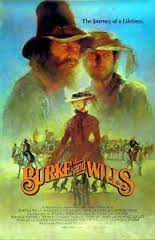
BURKE AND WILLS
Australia, 1985, 140 minutes, Colour.
Jack Thompson, Nigel Havers, Greta Scacchi, Matthew Fargher, Arthur Dignam, Chris Haywood, Ralph Cotteril, Drew Forsythe, Hugh Keays Byrne.
Directed by Graeme Clifford.
Burke and Wills was one of the most spectacular films made in Australia. It had a large budget, location photography in the areas in which Burke and Wills explored. It was directed by Graeme Clifford, writer-editor who became a noted Hollywood director with his biography of Frances Farmer, Frances with Jessica Lange.
The film is presented in the epic style. It focuses on Melbourne in the 1860s, the trek towards the Gulf of Carpentaria through northern Victoria, western New South Wales, Queensland to Cooper's Creek. The voyage was ill-fated poorly organised by the moneyed powers in Victoria, wilfully led by Robert O'Hara Burke, wilfully ignoring the help that might have been gained from the aborigines. These themes are strong in the film.
Jack Thompson is strong as Burke. Nigel Havers is, by way of contrast, gentle and loyal as Wills. There are some interesting supporting performance from Matthew Cargher as King. The film highlights the adventure of the period. the political and financial wranglings, the attitudes of British supremacy at the time. Aboriginal themes are well explored.
Photography is by Russell Boyd. There is a Peter Sculthorpe musical score. (At the same time, a small-budget parody: Wills and Burke, the Untold Story was made with Garry Mc Donald and Kym Gyngell in the central roles. While it was more historically accurate at times, it parodied the foibles of Burke and Wills as well as of the Establishment, it was no cinematic rival to this film.)
1. The quality of the film? Its impact, acclaim? Interest? Appeal? Australian audiences? International audiences?
2. Budget, re-creation of period: Melbourne, the Princess Theatre, the Outback: the desert locations, Cooper's Creek, the Gulf of Carpentaria, the sea? Panavision photography, landscapes, desertscapes? The contrast with the English sequences? The musical score, themes, songs, 'I Dreamt that I Dwelt in Marble Halls'?
3. The structure of the film: Wills' remark, the transition to the desert? The sequence recurring? The expedition, the drive behind it, the memories of each man? Memories and fantasies interspersed with the exploration? The Melbourne sequences interspersed with the desert? The finale, King's speech, the flashback to the death of Burke and Wills? The dramatic impact of this structure? Heightening the drama and the tragedy?
4. Audience knowledge of Australian history, the explorers? Facts and difficulties? The challenge of the continent? Rivalries of explorers, their backers? The expertise and lack of expertise, heroism, folly?
5. The exploration and the experience of 19th century British Empire expanding? The colonies? Australian landscapes? Colonial atmosphere? presumptions about civilisation? Fame and honour? Conquering the land (as for Burke?) Seeing the land (as for Wills)? Scientists and their achievement? The exploiters of the land? Problems of communications, supplies, alien landscapes, the relationship with the aborigines? The opening up of the land for white settlement?
6. The aboriginal background - and the perspective of the 1800s? Australian consciousness? The land being that of the aborigines, their being in harmony, surviving for thousands of years, peaceful? The suspicious attitudes of the 19th century explorers? The ignoring of culture, the clashes and challenge of culture? Burke not understanding, suspicious, finally hostile? Wills willing to learn? Suspicions and shooting? The caves, the caves as the equivalent of a church? The initiation ceremonies, the dances, the painting, the wall-paintings, the sacredness of the atmosphere, the land and the animals? Hunting, fishing? The ironic humour of the cricket match and throwing back the cricket ball, the gifts, the fish and the cricket bat? The aborigines tracking Burke and Wills, miming the funny stories in their dances? Their respect for the dead? healing King? The possible harmony between black and white? The black guide and his explanations? Insight into black-white relationships in the 19th. century?
7. The Geographical Society, its ambitions,-.fanfare? The setting for the expedition? Business and financial backing?. The elders and their decisions? The choice of Burke? Belief in him? Wills, his father, the letters? The hesitations? The rivalry with John McDowall? Stuart? Not paying the wages, abandoning the expedition? News coming through too late? The press conference and the humiliation of Kyte? Conscience? King and his speech, the text given to him, the gold oath, his putting it down? His being moved to speak? The applause and the standing ovation? The critique of the Geographical Society?
8. Burke and his police background, Irish, attitude towards civilisation, reputation for being lost? The infatuation with Julia Matthews, the return from Essendon? The night with her? His later imagining their wedding and the celebration? Burke as leader, relentless? The clash with Landells about the camels, the rum, crossing the Murray? Landells pulling out? Hiring Wright at Menindee? The bond with Wills? Sharing vision, loyalty? The experience of the expedition, Cooper's Creek and the aborigines, cricket, decisions. going towards the Gulf? The wisdom in his decision - or not? His leaving William behind? The harshness of the desert, the achievement of* the Gulf? The exhilaration on the shore? The return, the hunger, the swamps? Greg and his stealing the flour, his flogging him? The burial and the loss of a day, his motivations? The return to Cooper's Creek, hallucinations, the bagpipe? His death? The tragedy - although a great show? The achievement of Burke, his place in Australian history and exploration?
9. The contrast with Wills: the opening, the English family, the game in the maze, his quest to get out, his sister's anxiety? The transition to the expedition and his being lost? His father and his support, the chat with Burke? The letter and the watch for his father at the end? The expedition, his knowledge, determination? Keeping the diary, the narrative voice-over device? His estimate of the expedition, of Burke? Travel, progress, observations? The dilemma about the sepoy and the eating of pork? The difficulties in crossing the Murray? Difficulties at Menindee? The clashes, going to Cooper's Creek? The terrain, the loss of the compass? At Cooper's Creek, the aborigines, the gift of the cricket bat? The wisdom of the dash to the Gulf? The four, relating to the travel and the heat, water and food, the compass lost, the aborigines, the sea and the achievement? Going back, the hardships, the death of the camels, Grey stealing the flour, the flagging and the sense of duty, the burial and the dag lost, the struggle, his feet, the maze memory, the arrival, the decision to go on, the clash with Burke, the aborigines, his death? His achievement?
10. Grey as the grizzled explorer, age, experience, antagonism and hostility towards the aborigines, suffering from the heat, his throat, his stealing the flour, being flogged, his discussion about religion and prayer with King, his philosophy about God, death, burial? King' s memory of him? the watch ?
11. King and his youthfulness, amongst the final four, earnest, his praying, the funeral and his prayer for Grey? Being helped by the aborigines, the return to Melbourne, encouragement of Julia Matthews, reading his text, his spontaneous speech, his memory of the achievement?
12. The Members of the expedition: the Scotsman, his fishing, the bagpipes, presence at the final speech and his applause? The man at Cooper's 'Creek, delirium, shooting the rats, hostile to the aborigines? the trust given to him, German background, watching the distances, with his telescope, the decision to leave, burying the supplies, his return, presence at the final speech?
13. Landells and his eccentricity, dress, the camels, bringing then from India, his stances against Burke, the crossing of the Murray, the problem of the rum, his return, presence at the end?
14. Wright and his skills, not leaving Menindee, demanding his money, his presence, at the final speech - and his consciousness of what had happened?
15. Kyte and society, the money, his infatuation with Julia Matthews, his wife, not sending the money, elegant meals, with the members of the Geographic Society, discussions, Julia Matthews' concert and the news about the expedition? The hostility of the press? His trying to save face at the end? His humiliation? Sir William, and the other authorities, their motives, decisions? Kyte's wife, society, disdain for Julia Matthews, presence at the theatre and concerts, her standing at the end?
16. Julia Matthews and her background in the theatre, at the launching of the expedition, in the public eye, her song, 'I Dreamt that I dwelt in Marble Halls', the infatuation of the night with the concert and her concern and attack on the aristocracy, her place in Burke's fantasy, her support of King at the end, the ring and her declaration of being Burke's wife?
17. A piece of Australiana, 19th century exploration? failure? The memory of the expedition? Success and failure?
Published in Movie Reviews
Published in
Movie Reviews
Tagged under
Saturday, 18 September 2021 19:27
Bush Christmas/ 1983
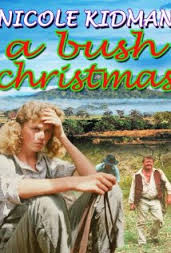
BUSH CHRISTMAS
Australia, 1983, 91 minutes, Colour.
Jon Ewart, Nicole Kidman, John Howard, Mark Spain.
Directed by Henri Saffran.
Bush Christmas is a 1980s remake of the Australian classic film of the post-war period, Harry Watt’s Bush Christmas, which starred Chips Rafferty.
This film is in colour, has bush locations and scenery. It is the story of a family who have experienced drought and who are pinning their hopes on their horse, Prince, winning the New Year’s Day race. However, two crooks, played by John Ewart and John Howard, steal the horse. The children, with the aid of their Aboriginal friend Manalpuy, go into the bush to recover the horse.
This is a family feature, a genial kind of Australian family film. Of interest is that it is one of the earliest films for Nicole Kidman who went on to great success during the 1980s in Australian films and television and then became an international star, winning the Oscar for The Hours in 2002.
Direction is by Henri Safran who made a number of films in Australia, especially the well-received family film, Storm Boy.
1. An entertaining family film? Children's film? Australian audiences? Overseas? observation of a particular period, children, family, adventure? Message?
2. The popularity of the original film of the '40s? A contemporary film for contemporary audiences? The nostalgia of this version? its impact for an '80s audience?
3. The use of Queensland location photography: bush, the town, the grazing paddocks, the mountains? The atmosphere of the bush? The white view of the bush? Aboriginal view? English view? Australian summer, Christmas? The contribution of the musical score and its atmosphere? The Bushwackers? The songs and dances? The incorporation of aboriginal music and instruments?
4. Re-creation of the period: the Queensland bush town, family life, country dances, country race meetings? Decor, costumes etc.?
5. The atmosphere and difficulties: the father and the drought, the sale of the property, the estate agent and his overbearing attitudes? The cattle unable to be sold? The children and the stolen horse, the search? The father and his droving, search for his children? The mother and his running the house, concern? Finance, hopes? The celebration of Christmas?
6. The portrait of the Australian children - at home, the difficulties, on the back of the truck, the dance? Johnny and his shyness? Attitude towards girls? Mike and the English boy on holidays? Helen and her enjoyment of the dance? The humorous attitudes towards the 'Posh' cousin? Their decision to go to search for the horse? Their all going, riding, walking, hunger, rain and being drenched, drying their clothes, eating the lizard? The importance of Manalpug's presence? His prayers, contact with other aborigines, receiving guidance, from magic and song, food? His care for them? Helen's violating the sacred site? The catching up with Bill and Sly? The raid, the boots, the gun? The discovery of the old house - and the cobwebs and skeleton reminiscent of Miss Haversham in Great Expectations? Falling down the well and the water filling up? The rescue? Johnny letting go?
7. Bill and Sly as comic villains? John Ewart's and John Howard's skill at creating character, humour? Conmen? Their promotion of the group? Sly and his vanity, songs? His boots? The stealing of the horse and its difficulties? The trek through the bush? The rain, the cold, the soreness in riding, walking? Bill and his dreams? Confidence tricks and money? Pushing Sly? The end and his relenting - the hanging and the well?
8. Sly and his singing, clothes, slow-witted, gawky attitudes, jokes, fondness for his boots - and losing them? A figure of fun?
9. Ocker humour and mockery?
10. Manalpuy and the riding during the opening sequences, the hopes for the race, his presence with the group, acceptance? The raising of the aboriginal question? Place of the dance, in the house, leading the group in the search? Aboriginal rituals and music? The help of the tribe? Helen in the ring? The tribe not forgiving? Eating the lizard? The clash with Mike and his English attitudes and superiority? Helping the group to survive? Helping with the well? Winning the race – despite all the opposition and the hindrances from other jockeys? A picture of black-white relationships - from the '40s, for the '80s?
11. The sale of the property, the agent and his own horse and jockey? Double-dealing? The excitement of the race?
12. Themes of the land, pioneers, drought and difficulties, family spirit, exploitation? The spirit of the pioneers? Nostalgia for the past? The heritage? Aborigines? A family film?
Published in Movie Reviews
Published in
Movie Reviews
Tagged under
Saturday, 18 September 2021 19:27
Brothers
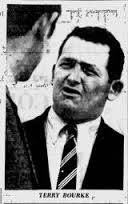
BROTHERS
Australia, 1982, 103 minutes, Colour.
Chad Hayward, Ivar Kants, Alyson Best, Roger Ward, Ricky May.
Directed by Terry Bourke.
Brothers, written and directed by Terry Bourke (Inn of the Damned, Night of Fear, Plug, Little Boy Lost, Lady Stay Dead) begins promisingly but eventually falls rather flat.
The film is of the genre focusing on newspaper correspondents and photographers experiencing war. The first 15 minutes, with its re-creation of East Timor in 1975, is quite effective. The plot then returns the characters to New Zealand and involves them in romance, violence, misunderstood relationships. While the scenery is excellent, the dramatics are not particularly interesting. The film has quite a good cast led by Ivar Kants and Chard Hayward. Singer Ricky May is introduced.
However, the film is another of Terry Bourke's poor feature films.
1. Interest in themes? Treatment? An enjoyable film?
2. The re-creation of East Timor 1975? Special effects, stunt work? New Zealand locations, New Zealand life, towns and cities? Musical score?
3. The focus of the title, the emphasis on the relationship between Kevin and Alan? Interest, themes, development? The opening disclaimer that the incidents were not based on real characters? The fact of Australian journalists being killed in East Timor in 1975? The role of Indonesia, the role of Australia, the Timorese, Fretilin? International attitudes towards East Timor? Subsequently? The film's re-creation of the atmosphere of battle, raids? The journalists and their presence, covering the war, fears, dangers? The Indonesians and their attack, executions? A quick evocation of the reality of East Timor?
4. The New Zealand story - pedestrian material, pedestrian treatment? Life in the small town, the outsider coming to disturb, emotional relationships, marriage, the girl with the reputation in town, the move to the city, double-dealing, clashes? Respectable values, religious stances, clashes? The falling out of brothers?
5. The sketch of Kevin and Alan? Alan and his need for adventure, his reputation, his winning awards? Relationship with women? Return to the town? The clash with Kevin's fiancee's family? His being the odd man out in the town? Trying to settle in? Janine and the relationship? The liaison and his betrayal of Janine? The clash between the two brothers? The fight to resolve their differences and their relationship? Kevin and his skill at work, his return to New Zealand, professional work, his skill as a photographer, avoiding memories of the war? Fiancee, family, respectability? His dislike for Alan? Love for him? The fight? The New Zealand lifestyle, morals, respectability? The proper family and their severe attitudes towards Alan? The fiancee? The parents? Their hold over Kevin? Their spurning of people who did not share their respectable values? Churchgoing? The attack on their double standards and hypocrisies? Kevin fitting into this family?
6. Janine and her mother? Reputation? Liaison with Alan? A possibility of redemption? The city, her leaving? Return and catching Alan with his girlfriend? Disillusionment? Violence? The repercussions on Alan? The range of supporting characters - the personalities in the town and their stances? The media personalities? Alan's girlfriend?
10. The themes of journalists and their professional life and private life? Repercussions of war? New Zealand society and its standards?
Published in Movie Reviews
Published in
Movie Reviews
Tagged under
Saturday, 18 September 2021 19:27
Betty Cuthbert
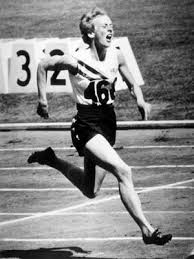
BETTY CUTHBERT
Australia, 1988, 50 minutes, Colour.
Directed by Kathy Mueller.
Betty Cuthbert, the golden girl of running of the 1950s with her success in the Melbourne Olympics, her lack of success at Rome but her vindication of her career in Tokyo, is one of Willessee's Australians. The film focuses on the '50s and the atmosphere of the Games. Betty Cuthbert herself as a teenager and her will to succeed. It shows her difficulties at the time of the Rome Olympics, her decision to retire, the challenge to come back and her success in Tokyo.
The film is well cast, interestingly written, was written by Kathy Mueller, director of the striking short film Every Day, Every Night about Vietnam veterans and is a memoir of the times.
1. The choice of Betty Cuthbert as one of Willessee's Australians for the Bicentenary?
2. The re-creation of the 1950s, Sydney, the Melbourne Games? The glimpses of Rome and the Tokyo Games? The musical score?
3. Audience knowledge of Betty Cuthbert? in sport? Training, success, the Olympics? Her acting as consultant for the film?
4. Australian love of sport? Women, Betty Cuthbert as a winner?
5. The portrait of Betty as a schoolgirl, shy, scenes at home, with her parents, sister? Ordinary Sydney homes of the time? Her running, training, winning? The build-up to the Olympics? Her parents' scepticism? Her success?
6. June and her background in training, her family? The decision to train Betty? The rivalry with Marlene Matthews? Winning, training, selection? June and her winning the competition to go to the Games? Betty's parents and their support at the Games?
7. Life after the Games, publicity, her feeling awkward? Her sister getting her to change her hair, her going out? The boyfriend and the awkward socialising? her having to make a speech, being a promoter? Her awkwardness, her training, the lessons in speech-making, her confidence and her success as a public speaker?
8. Injuries and difficulties? her being hampered in Rome? Her lack of success? Her foot, the inability of medical people to find out what was wrong? Her giving up and retiring? June's attitudes? Her going to the doctor, finding out what was the trouble?
9. The build-up to Tokyo, the training, success?
10. The postscript to the story with the information about Betty Cuthbert suffering from Multiple Sclerosis? An Australian heroine?
Published in Movie Reviews
Published in
Movie Reviews
Tagged under